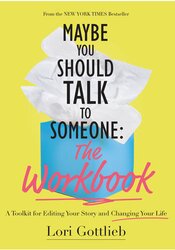Picking Apart Pain

One of my big revelations in Maybe You Should Talk to Someone happens after my own therapist, Wendell, interrupts my obsessing about my ex-boyfriend by standing up, walking across his office, and lightly kicking my foot with his long leg.
“What was that?” I asked.
“Well, you seem like you’re enjoying the experience of suffering, so I thought I’d help you out with that.”
He wisely explained that there’s a difference between pain and suffering. Pain is beyond our control—it’s part of being a person in the world. We’re all going to experience pain at times, but we don’t have to suffer so much. “You’re not choosing the pain, but you’re choosing the suffering,” Wendell said.
He was right. I was creating my own suffering by telling the story of Boyfriend over and over, by Googling him and making up stories about what I’d found—stories that inevitably provided evidence for a bigger story: I wasn’t lovable enough.
Our pain holds important clues about what’s not working in our lives and what we might start to change. Nobody likes to feel it, though, so we push it away any way we can. We gloss over painful feelings or we lash out at others because of it. More often, we turn those feelings inward and berate ourselves. All of this serves to take the pain, which may have been initially helpful, and twist it into something more like suffering.
So how do you shift out of suffering?
Here’s where reading between the lines can help. By examining a few pain points in your stories, you begin to see what that pain is telling you and where you’re creating suffering. Consider this exercise our workbook’s version of Wendell’s kick.
“What was that?” I asked.
“Well, you seem like you’re enjoying the experience of suffering, so I thought I’d help you out with that.”
He wisely explained that there’s a difference between pain and suffering. Pain is beyond our control—it’s part of being a person in the world. We’re all going to experience pain at times, but we don’t have to suffer so much. “You’re not choosing the pain, but you’re choosing the suffering,” Wendell said.
He was right. I was creating my own suffering by telling the story of Boyfriend over and over, by Googling him and making up stories about what I’d found—stories that inevitably provided evidence for a bigger story: I wasn’t lovable enough.
Our pain holds important clues about what’s not working in our lives and what we might start to change. Nobody likes to feel it, though, so we push it away any way we can. We gloss over painful feelings or we lash out at others because of it. More often, we turn those feelings inward and berate ourselves. All of this serves to take the pain, which may have been initially helpful, and twist it into something more like suffering.
So how do you shift out of suffering?
Here’s where reading between the lines can help. By examining a few pain points in your stories, you begin to see what that pain is telling you and where you’re creating suffering. Consider this exercise our workbook’s version of Wendell’s kick.
Get the Toolkit for Editing Your Story & Changing Your Life

When Maybe You Should Talk to Someone was released into the world, it became an instant New York Times bestseller and international phenomenon, with readers across the globe finding their truth in the powerful stories Lori Gottlieb shared from inside her therapy room. As millions highlighted and underlined page after page, a movement took shape and they asked for more: Can you take these lessons and create for us a guide as transformative as the book itself?
Lori decided to do just that. In this empowering, one-of-a-kind workbook, Lori offers a step-by-step process for becoming the author of your own life by giving it a thorough edit. Using eye-opening concepts, thought-provoking exercises, compelling writing prompts, and real examples from the patients in the original book, Lori has created an easy-to-follow guide through the journey of becoming our own editors, examining aspects of our narratives that hold us back, and discovering the ways in which changing our stories can change our lives.
An experience, a meditation, and a practical toolkit combined into one, Maybe You Should Talk to Someone: The Workbook is the companion readers have been asking for: a revolutionary method for understanding which stories to keep and which to revise so that we can create our own personal masterpieces. By the end of this “unknowing,” you will be surprised, inspired, and most of all, liberated.
Lori decided to do just that. In this empowering, one-of-a-kind workbook, Lori offers a step-by-step process for becoming the author of your own life by giving it a thorough edit. Using eye-opening concepts, thought-provoking exercises, compelling writing prompts, and real examples from the patients in the original book, Lori has created an easy-to-follow guide through the journey of becoming our own editors, examining aspects of our narratives that hold us back, and discovering the ways in which changing our stories can change our lives.
An experience, a meditation, and a practical toolkit combined into one, Maybe You Should Talk to Someone: The Workbook is the companion readers have been asking for: a revolutionary method for understanding which stories to keep and which to revise so that we can create our own personal masterpieces. By the end of this “unknowing,” you will be surprised, inspired, and most of all, liberated.






